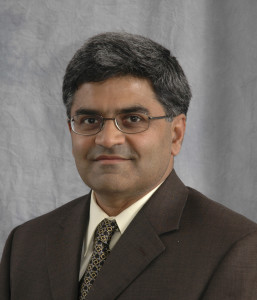This tutorial will present the DynamoRIO tool platform and describe how to use its API to build custom tools that utilize dynamic code manipulation for instrumentation, profiling, analysis, optimization, introspection, security, and more. The DynamoRIO tool platform was first released to the public in June 2002 and has since been used by many researchers to develop systems ranging from taint tracking to prefetch optimization. DynamoRIO is publicly available in open source form and operates on Linux and Windows on IA-32, AMD64, and ARM platforms.
This tutorial will present gpucc, an open-source compiler built by Google targeting CUDA and NVIDIA GPUs. gpucc performs various general and CUDA-specific optimizations to generate high performance code. It outperforms NVIDIA’s toolchain (nvcc) on internal large-scale end-to-end benchmarks by up to 51%, and is on par for several open-source benchmarks (Rodinia, SHOC and Tensor). It supports modern language features such as those in C++11 and C++14, and compiles code 8% faster than nvcc, up to 2.4x faster for pathological compiles.
This tutorial will cover the following topics:
- Using gpucc
- gpucc system overview: a brief description of how gpucc works under the hood
- Detailed performance results of gpucc vs nvcc
- Compiling CUDA programs with gpucc: a demo on how to install gpucc and compile some sample CUDA programs
- Contributing to gpucc
- Performance debugging: how to debug the performance of generated binary by using nvprof and observing device code
- Writing new optimizations for gpucc
50 Years of Parallel programming: Ieri, Oggi, Domani*
Parallel programming started in the mid-60’s with the pioneering work of Karp and Miller, David Kuck, Jack Dennis and others, and as a discipline, it is now 50 years old. What have we learned in the past 50 years about parallel programming? What problems have we solved and what problems remain to be solved? What can young researchers learn from the successes and failures of our discipline? This talk is a personal point of view about these and other questions regarding the state of parallel programming.
* The subtitle of the talk is borrowed from the title of a screenplay by Alberto Moravia, and it is Italian for “Yesterday, Today, Tomorrow.”
Biography
 Keshav Pingali is a Professor in the Department of Computer Science at the University of Texas at Austin, and he holds the W.A.”Tex” Moncrief Chair of Computing in the Institute for Computational Engineering and Sciences (ICES) at UT Austin. Pingali is a Fellow of the IEEE, ACM and AAAS. He was the co-Editor-in-chief of the ACM Transactions on Programming Languages and Systems, and currently serves on the editorial boards of the ACM Transactions on Parallel Computing, the International Journal of Parallel Programming and Distributed Computing. He has also served on the NSF CISE Advisory Committee (2009-2012).
Keshav Pingali is a Professor in the Department of Computer Science at the University of Texas at Austin, and he holds the W.A.”Tex” Moncrief Chair of Computing in the Institute for Computational Engineering and Sciences (ICES) at UT Austin. Pingali is a Fellow of the IEEE, ACM and AAAS. He was the co-Editor-in-chief of the ACM Transactions on Programming Languages and Systems, and currently serves on the editorial boards of the ACM Transactions on Parallel Computing, the International Journal of Parallel Programming and Distributed Computing. He has also served on the NSF CISE Advisory Committee (2009-2012).
Chair: Louis-Noël Pouchet (Ohio State University)
#91: Daniele G. Spampinato and Markus Püschel. A Basic Linear Algebra Compiler for Structured Matrices
#38: Lénaïc Bagnères, Oleksandr Zinenko, Stéphane Huot and Cédric Bastoul. Opening Polyhedral Compiler’s Black Box
#64: Gabriel Rodríguez, José M. Andión, Mahmut Kandemir and Juan Tourino. Trace-based Affine Reconstruction of Codes
Chair: Michael O’Boyle (University of Edinburgh)
#42: Mateus Tymburiba, Rubens Emílio and Fernando Pereira. Inference of Peak Density of Indirect Branches to Detect ROP Attacks
#25: Yulei Sui, Peng Di and Jingling Xue. Sparse Flow-Sensitive Pointer Analysis for Multithreaded C Programs
#43: Vitor Paisante, Maroua Maalej, Leonardo Barbosa, Laure Gonnord and Fernando Pereira. Symbolic Range Analysis of Pointers
Chair: Mauricio Breternitz (AMD)
#74: Vassilis Vassiliadis, Jan Riehme, Jens Deussen, Konstantinos Parasyris, Christos D. Antonopoulos, Nikolaos Bellas, Spyros Lalis and Uwe Naumann. Towards Automatic Significance Analysis for Approximate Computing
#17: Kevin Brown, Hyoukjoong Lee, Tiark Rompf, Arvind Sujeeth, Christopher De Sa, Christopher Aberger and Kunle Olukotun. Have Abstraction and Eat Performance Too: Optimized Heterogeneous Computing with Parallel Patterns
#28: Melanie Kambadur and Martha Kim. NRG-Loops: Adjusting Power from Within Applications